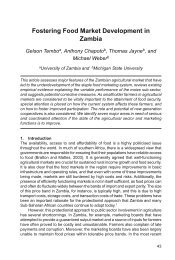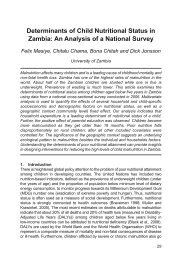Introduction to Basic Legal Citation - access-to-law home
Introduction to Basic Legal Citation - access-to-law home
Introduction to Basic Legal Citation - access-to-law home
You also want an ePaper? Increase the reach of your titles
YUMPU automatically turns print PDFs into web optimized ePapers that Google loves.
amount of compensation an at<strong>to</strong>rney may receive for representing a petitioner in a postconviction<br />
death penalty case is $ 37,500. Id. Under these rules, the Division of Finance will<br />
also "pay reasonable litigation expenses not <strong>to</strong> exceed a <strong>to</strong>tal of $ 20,000 in any one case for<br />
court-approved investiga<strong>to</strong>rs, expert witnesses, and consultants." Utah Admin. Code r. 25-14-<br />
5.<br />
. . . .<br />
48 On April 22, 2004, Menzies filed a notice of appeal with the district court indicating that<br />
he would seek review of the court's denial of 60(b) relief as well as the order regarding the<br />
destruction of the inadmissible documents. Menzies' appeal is now before this court. We have<br />
jurisdiction pursuant <strong>to</strong> Utah Code Ann. § 78-2-2(3)(i) (2002).<br />
. . . .<br />
65 The first question we must consider is whether Menzies' 60(b) motion was timely. A<br />
motion under 60(b) must "be made within a reasonable time and for reason[] (1) . . . not more<br />
than 3 months after the judgment . . . was entered." Utah R. Civ. P. 60(b). In cases where<br />
subsection (b)(1) applies, a movant may not attempt <strong>to</strong> circumvent the three-month filing<br />
period by relying on another subsection. Russell v. Martell, 681 P.2d 1193, 1195 (Utah 1984);<br />
Laub v. S. Cent. Utah Tel. Ass'n., 657 P.2d 1304, 1308 (Utah 1982); Richins v. Delbert<br />
Chipman & Sons Co., 817 P.2d 382, 387 (Utah Ct. App. 1991). Under rule 60(b), a reasonable<br />
time "depends upon the facts of each case, considering such fac<strong>to</strong>rs as the interest in finality,<br />
the reason for the delay, the practical ability of the litigant <strong>to</strong> learn earlier of the grounds<br />
relied upon, and prejudice <strong>to</strong> other parties." Gillmor v. Wright, 850 P.2d 431, 435 (Utah 1993)<br />
(citations and internal quotation marks omitted). In general, the moving party satisfies the<br />
reasonable time requirement if she shows "that she acted diligently once the basis for relief<br />
became available, and that the delay in seeking relief did not cause undue hardship <strong>to</strong> the<br />
opposing party." Workman v. Nagle Constr., Inc., 802 P.2d 749, 752 (Utah Ct. App. 1990)<br />
(citation and internal quotation marks omitted).<br />
. . . .<br />
68 The problem with the State's argument is that the State fails <strong>to</strong> distinguish between a<br />
motion that is properly supported for purposes of the particularity requirement and a motion<br />
that is timely filed for purposes of avoiding the limitations provisions of 60(b). Both rule 7<br />
and rule 4-501 are designed <strong>to</strong> "promote the policies of (1) mitigating prejudice <strong>to</strong> opposing<br />
parties by allowing that party <strong>to</strong> respond <strong>to</strong> the motion . . . and (2) assuring that a court can be<br />
apprised of the basis of a motion and rule upon it with a proper understanding." See Holmes<br />
Dev., LLC v. Cook, 2002 UT 38, 58, 48 P.3d 895 (discussing requirements for motions <strong>to</strong><br />
amend). If a party fails <strong>to</strong> "comply with Utah's formal motion practice rules," a district court<br />
may, within its discretion, deny the motion on the grounds that it is insufficient. Id. 59.<br />
However, sufficiency is not a logically necessary component of timeliness. A party can timely<br />
move the court for relief despite the fact that its motion may be insufficient because, for<br />
example, it lacks particularity. In such a situation, the court has the discretion, consistent with<br />
the policy concerns noted above, either <strong>to</strong> deny the motion as being insufficient or <strong>to</strong> allow<br />
the party <strong>to</strong> supplement the originally insufficient motion. In the case before us, the district<br />
court chose the latter option, holding that Menzies' 60(b) motion was timely filed and that<br />
239




